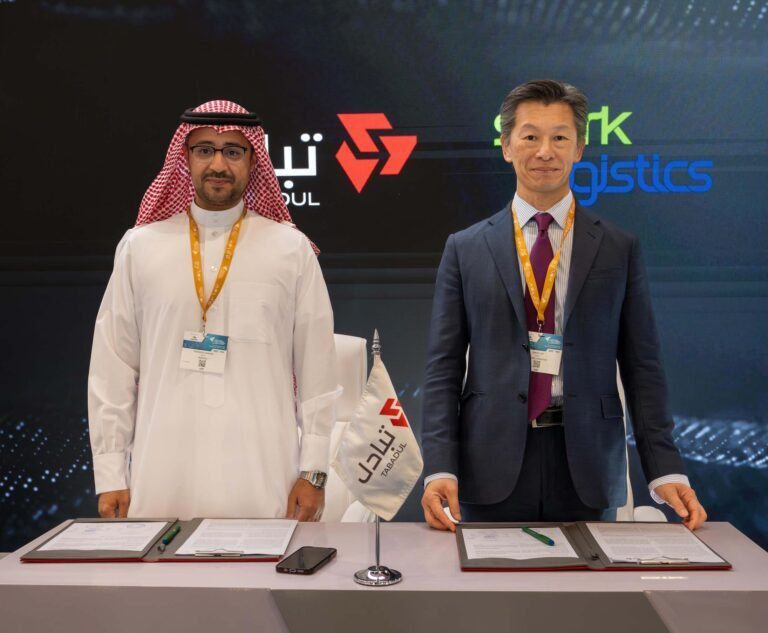The signing ceremony was held during Tabadul’s participation as the platinum sponsor of Saudi Maritime and Logistics Congress
Saudi Electronic Info Exchange Company (Tabadul), a key force in driving digital transformation and provider of business exchange solutions, signed a memorandum of understanding (MoU) with Energy City Logistics Company, subsidiary of King Salman Energy Park, a company specializing in logistics, development and operations of ports and special customs zones. The agreement was signed during Tabadul’s participation at the Saudi Maritime and Logistics Congress as the platinum sponsor. Hisham Alnasser CEO of Tabadul, and Dave Lee, CEO of Energy City Logistics Services Company, signed the MoU during the event, which was recently held at the Dhahran Expo in Dammam.
The MoU will establish a framework to reinforce mutual collaboration and promote the exchange of knowledge and expertise between Tabadul and Energy City Logistics Services Company in the logistics and supply chain sectors. Additionally, it aims to improve cooperation between both parties, further supporting the development of joint initiatives and adoption of best global practices to achieve strategic goals and the future vision of Energy City Logistics Services Company.
Hisham Alnasser, CEO of Tabadul, highlighted the significance of the Saudi Maritime and Logistics Congress, where Tabadul participated as a platinum sponsor. He stated that the event serves as an ideal platform for regional and international communication, sponsored by the leaders of Logistics, transport and trade attracting a large number of attendees and participants from the global maritime and logistics sectors. The congress facilitates the exchange of ideas and discussions on key future challenges that these vital sectors face. He further emphasized the leading position of the conference, which showcases the Kingdom’s growing prominence in the global logistics sector. It further offers a platform to explore avenues and reinforce partnerships, which are essential to achieving the objectives of Saudi Vision 2030.
“We are pleased to sign this MoU with Energy City Logistics Services Company, establishing a strong foundation to enhance our mutual cooperation. This strategic partnership is key to achieving the ambitious goals of both parties, allowing us to leverage our expertise in global trade facilitation by integrating trade systems and enhancing logistics and business services. It represents a key milestone in our efforts to drive digital transformation in the region’s and global trade exchange systems. By developing innovative technical solutions, we aim to boost performance and set new benchmarks for quality, reliability, and operational efficiency. This will enable our clients to leverage advanced tools to optimise their operations while supporting growth in the logistics and maritime transport sectors.”. added Alnasser.
As part of the agreement, Tabadul will support the development of digital and operational initiatives implemented by Energy Logistics Services Company through the design and creation of an integrated industrial community in cooperation with the public and private sectors. It will further attract investments, support the localisation of resources and increase KSA’s total export volume, which will be in line with the objectives of Saudi Vision 2030.
Tabadul seeks to develop secure technological solutions that streamline international trade by improving the efficiency and transparency of global trade systems. This reinforces Saudi Arabia’s position as a model for logistical operational excellence. Building on its distinguished legacy and leadership, Tabadul offers electronic solutions that facilitate seamless exchange of information, goods and services across both public and private sectors, with a focus on supporting the business community. The partnership agreement with Energy City Logistics Services Company is a testament to Tabadul’s commitment to expanding its partnerships to facilitate international trade by ensuring seamless engagement with all stakeholders in the logistics sector. This will further enhance integration and data connectivity among all parties by following an optimal method that ensures improved performance and workflow, along with increased flexibility and operational efficiency.


